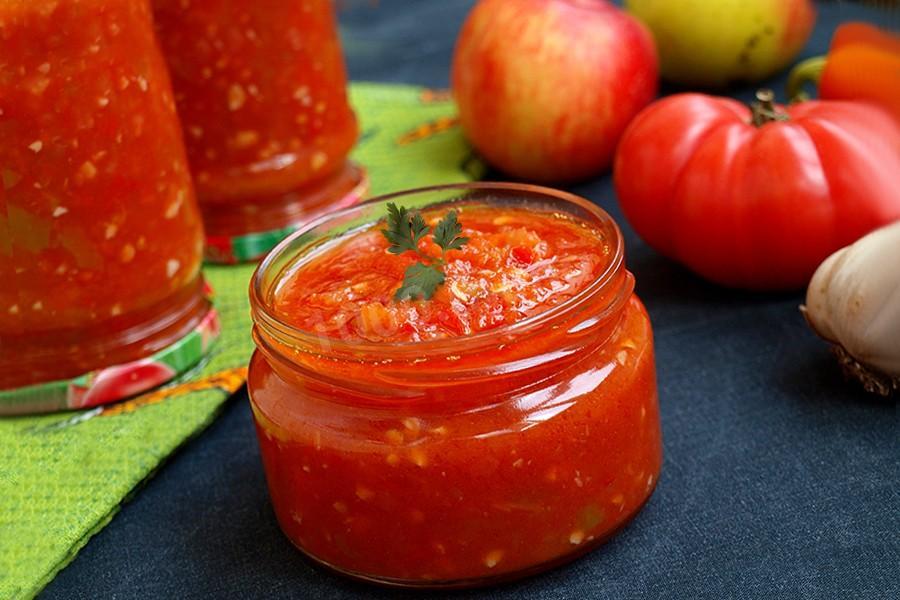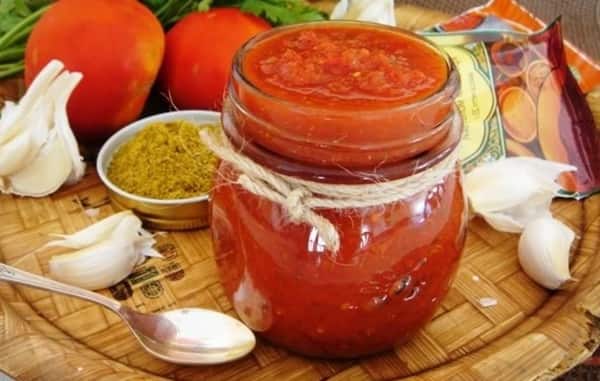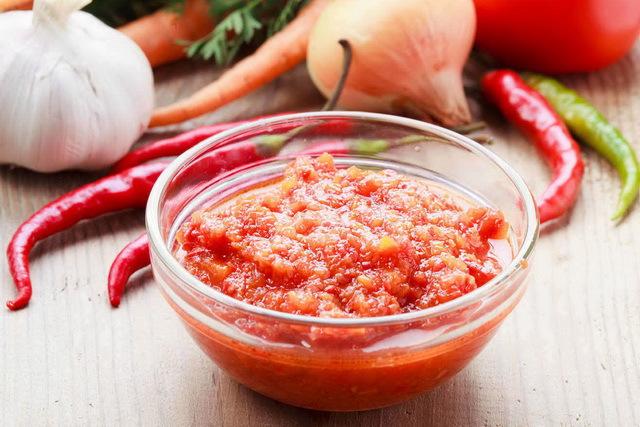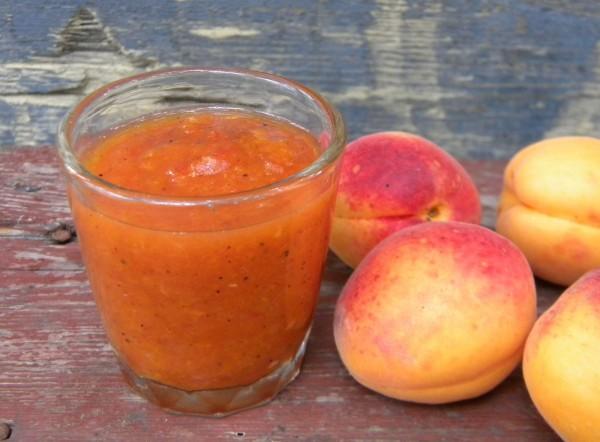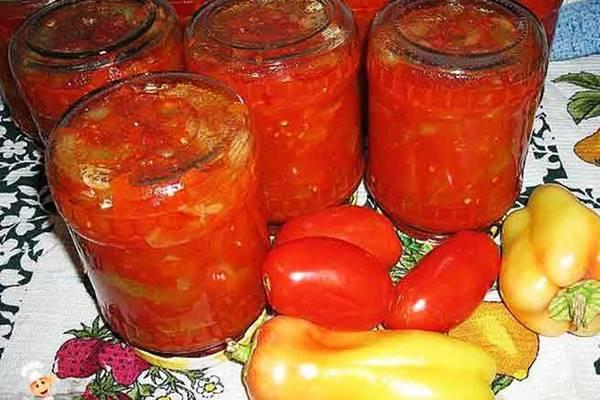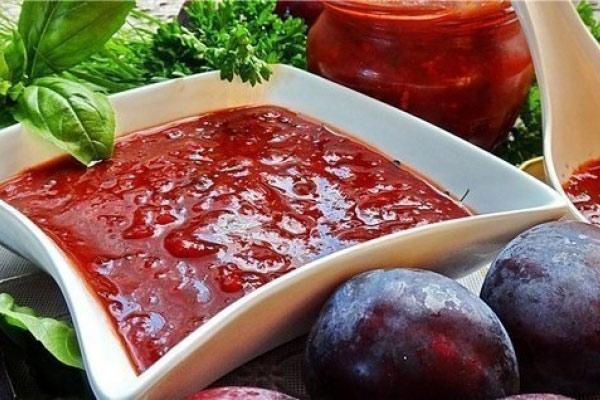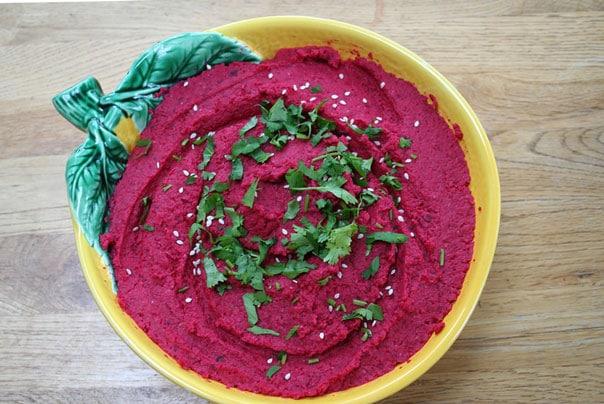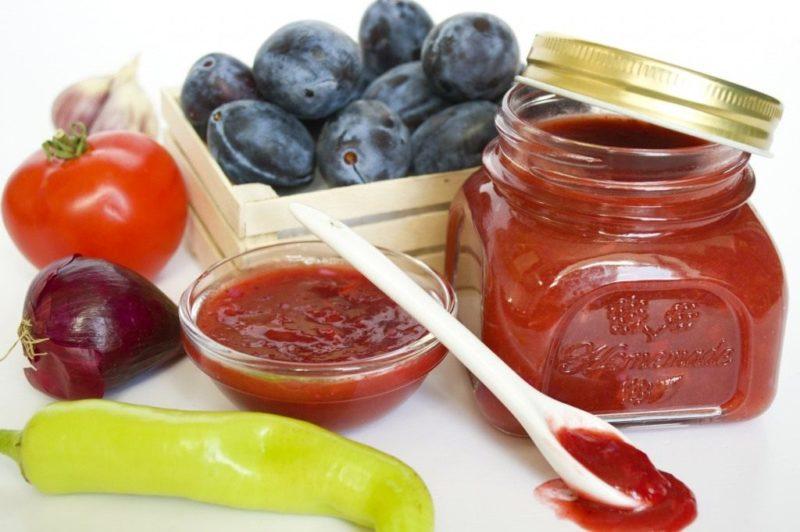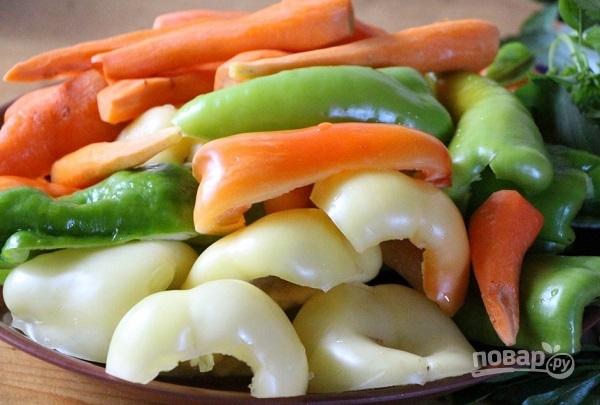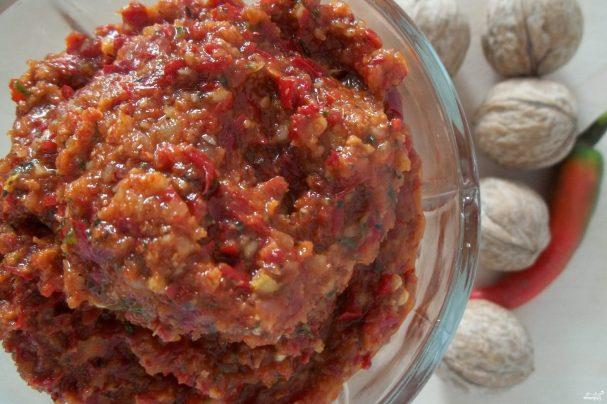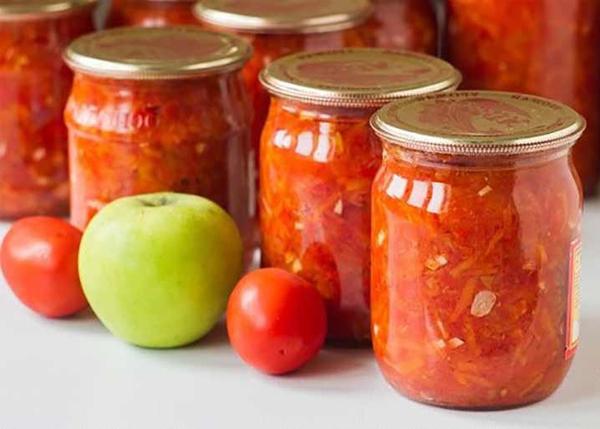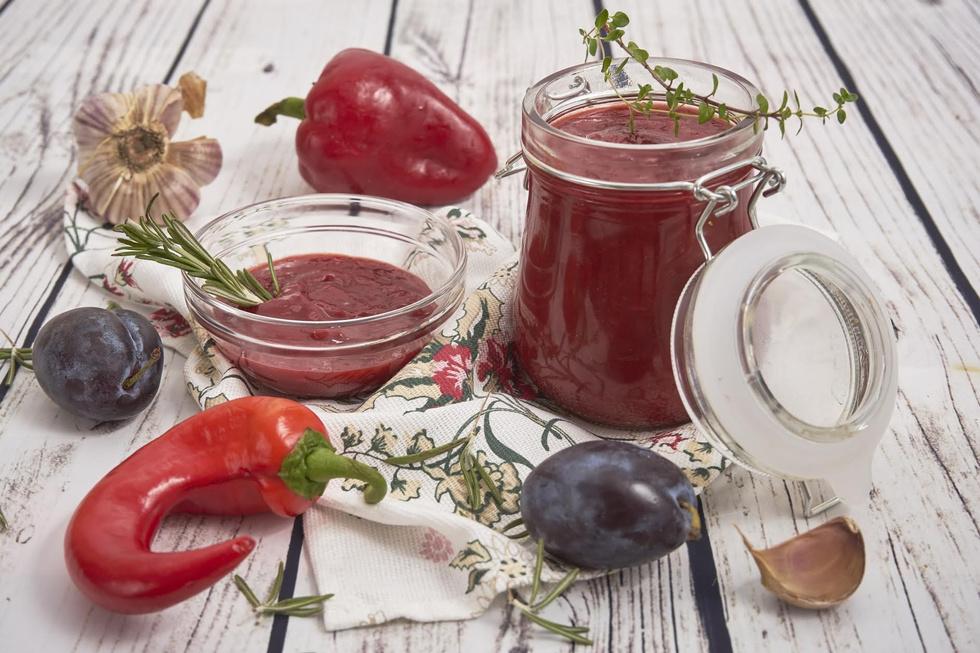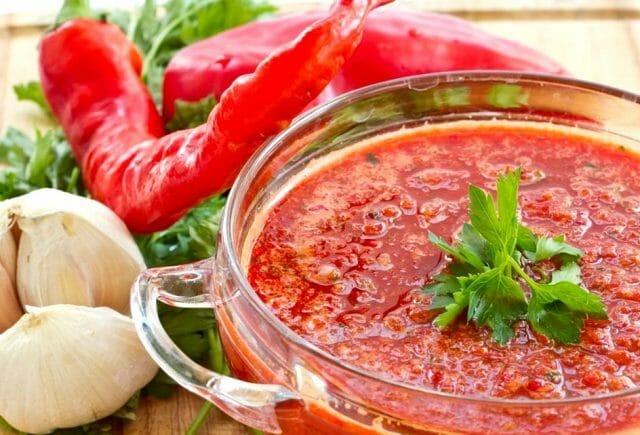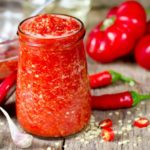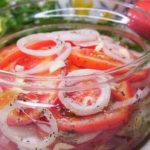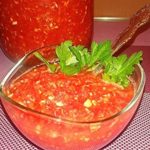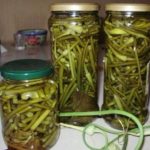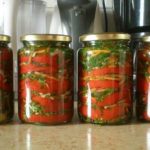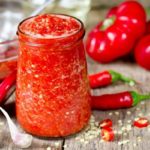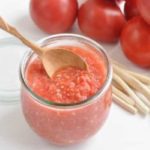Adjika is a dish of Georgian and Abkhaz cuisine, which is famous for its unsurpassed taste with notes of garlic and spices. A popular variation of Georgian seasoning is a recipe with a sweet taste. Sweet adjika, prepared for the winter, is ideal for meat dishes. Tomatoes, a small amount of carrots and various types of peppers are added to the traditional set of ingredients. Also, to achieve a unique taste, various types of fruits are used, which give a special unique sweetness.
- Features of preparing sweet adjika for the winter
- Preparing the main ingredients
- How to properly prepare containers
- Best Recipes
- Sweet homemade adjika
- With peppers and tomatoes
- With apricots
- Simple recipe
- With plums
- Beetroot sweet adjika
- With plums and sweet peppers
- With pepper and carrots
- With pepper and nuts
- With apples
- From prunes
- "Indian" adjika
- Terms and conditions of storage
In addition to excellent taste, sweet adjika will provide a sea of useful vitamins. That is why every housewife should master the recipe for this snack in order to enjoy the rich taste of summer vegetables on cold days.
Features of preparing sweet adjika for the winter
To make the seasoning really tasty, you need to use several rules for preparation and storage:
- the majority of the dish should be peppers and tomatoes;
- if you add more bell pepper and some carrots, the taste will become sweeter;
- various combinations of spices can add completely unique notes to the appetizer and add special spiciness;
- for winter canning, ingredients are always cooked at high temperatures;
- vegetables for adjika are cooked only in enamel pans;
- vinegar slows down fermentation processes, which helps the product to be stored longer;
- For storage, you should choose a cool place (for example, a refrigerator, pantry, basement, garage).
Preparing the main ingredients
Before you start cooking, you need to correctly select and carefully prepare each of the ingredients:
- tomatoes - many chefs do not recommend adding them to adjika, but this practice is carried out everywhere. Therefore, if tomatoes are in the recipe, then you need to scald them with boiling water, the skin will begin to come off on its own, and you can easily peel them;
- Garlic for adjika is suitable for any variety, you just need to peel it first;
- pepper – there are many varieties for snacks: habanero, serrano, jalapeno, poblano, Anaheim.Jalapeno and poblano peppers have medium heat. They are most often used for the basis of adjika. To add sweetness to the seasoning, add bell pepper to taste;
- carrots - takes the spiciness out of the dish. It must be cleaned and then grated on a coarse grater. It is important not to overdo it with the quantity so that its taste is not particularly noticeable;
- salt – mainly sea salt;
- spices - you can choose them to your taste, but Georgians often use suneli hops, coriander, marjoram, basil, dill. Many stores sell ready-made special seasoning for adjika, where all the necessary herbs are already mixed in the required proportions.
Experienced chefs warn that adjika should not contain traces of sweeteners, sunflower oil and onions. This contradicts the recipe for the snack, radically changing the taste.
How to properly prepare containers
Glass jars are chosen as containers for sweet adjika for the winter, which ensure the longest storage of the product. Before filling the product, the container is thoroughly cleaned with mustard and soda. Then you can sterilize using a microwave, oven, steam, or hot water.
The covers must be new and intact. They also need to be boiled before use.
When pouring hot adjika into glass jars, you should do this extremely carefully so that they do not burst under the influence of high temperatures.
Best Recipes
Abkhazian adjika is prepared in almost all corners of the world, but traditional recipes for sweet adjika never cease to please gourmets. To choose the most delicious option, you need to try various technologies for preparing paste-like seasoning.
Sweet homemade adjika
To prepare it you will need:
- 2-2.5 kg of regular fresh pepper;
- 5-6 hot red peppers;
- 200 g garlic;
- 100-150 ml grape or apple cider vinegar;
- salt, seasonings to taste.
Pre-clean the sweet pepper and other ingredients, then chop thoroughly. Bring the sauce to a boil. Leave to simmer over low heat for 1.5-2 hours, adding salt. Spices are added to the pan 5-6 minutes until fully cooked.
With peppers and tomatoes
This version does not use hot peppers, but does contain the following ingredients:
- 5 kg of juicy tomatoes;
- 1 kg bell pepper;
- half a kilo of grated carrots;
- the rest of the classic ingredients (garlic, vinegar, salt, seasonings).
All products must be separated from the peel and seeds and ground in a meat grinder. Leave on the stove for 2 hours, gradually adding salt and suneli hops into the pan.
With apricots
The basis of this unusual sauce is ripe apricots. To prepare you will need:
- 1.8 kg apricot;
- 1.3 kg apples;
- 3 kg of tomatoes;
- 1 kg carrots;
- 1 kg pepper;
- salt to taste.
Peel and pit vegetables. Mix in a blender. Cook for about half an hour over low heat, adding salt at the end. Roll up the container with the prepared mixture and place it under a warm blanket for 24 hours.
Simple recipe
This version of the dish is the easiest to make. To prepare it, you will need a small set of products:
- 1 kg bell pepper;
- half a kilo of garlic;
- 3 kg of tomato or tomato paste;
- 100 g hot pepper of your favorite variety;
- salt, seasonings.
All components are cleaned of excess, turned in a meat grinder or blender, the necessary seasonings and salt are added and left overnight without any heat treatment. The next day, the mixture can be put into containers prepared in advance and stored until winter.
With plums
There is no bell pepper in the recipe at all, but this does not make the adjika any less tasty.
Needed:
- 2 kg of sour plums;
- 3 pcs. hot hot pepper;
- 200 g garlic;
- half a glass of tomato paste;
- salt to taste.
Peel the plums, garlic, rub through a sieve with pepper. Then cook over low heat for 50 minutes, adding paste, sugar, and salt when finished. Pour into heated jars.
Beetroot sweet adjika
- 2 kg beets;
- 2 kg of tomatoes;
- 1 kg bell pepper;
- 250 g garlic;
- 2-3 hot peppers;
- 2 tbsp. l. soy sauce.
It’s just as easy to prepare as other versions of adjika: clean everything, bring it to a mushy state, after boiling, simmer for another hour over low heat, and finally add soy sauce. Boil for another 20 minutes.
With plums and sweet peppers
Like any fruity sweet sauce, this adjika will be an excellent addition to poultry dishes, with baked potatoes as a side dish.
Need to:
- 0.5 kg of ripe sweet plums;
- 0.5 kg of sweet pepper;
- a couple of hot peppers;
- 2 heads of garlic;
- 1 tbsp. spoon of tomato paste;
- sugar and salt to taste.
Place all purified products in a blender and bring to a paste. Pour the mixture into a saucepan, add tomatoes and salt. Cook for 40 minutes over low heat. In order for the seaming to be stored longer, experts advise pouring 2 tbsp at the very end of cooking. spoons of vinegar 9%. When the cans are rolled up, you need to turn them over and wait until the workpiece cools down.
With pepper and carrots
- 2.5 kg of sweet pepper;
- 5 pieces. spicy jalapeno;
- 1 kg of sweet apples;
- 150 g garlic;
- salt to taste;
- 1 glass of vinegar.
We clean all the products, grind them in a meat grinder, and cook over low heat for 1 hour. After cooling, add crushed garlic, salt, vinegar.
With pepper and nuts
This recipe is particularly piquant because it is based not on bell peppers, but on hot ones. Walnuts add a special flavor. To prepare you will need:
- 500 g hot pepper;
- 100 g walnuts;
- 400 g parsley, cilantro;
- 1 tbsp. l. coriander;
- 100 g garlic;
- salt to taste.
Gourmets recommend wearing special gloves on your hands before cooking. Nuts and garlic must be peeled, then passed through a fine meat grinder along with coriander seeds. The pepper does not need to be peeled. We also scroll it separately. Mix all the crushed ingredients and place them in the meat grinder again, achieving a homogeneous mass. Finally, add the chopped herbs. The sauce should sit for 3 days and only after that should it be put into jars for the winter.
With apples
This sauce is suitable for lovers of a mild but piquant taste. Need to take:
- 3 kg of ripe tomatoes;
- 3 kg of sweet pepper;
- 1 kg of apples with a sweet taste (Antonovka);
- 3 pcs. spicy jalapenos;
- 250 g garlic;
- 1 glass of vinegar;
- salt to taste.
Grind all ingredients except garlic, peeled, through a meat grinder or in a blender. Pour in vinegar and cook over medium heat for half an hour. 5 minutes before the end of cooking, add crushed garlic to the sauce.
From prunes
This option will conquer everyone with its unusual taste, despite the ease of preparation.
Needed:
- 1 kg bell pepper;
- 1 kg prunes;
- 1 PC. hot pepper of any kind;
- 250 g tomato paste;
- 200 g garlic;
- salt to taste.
All components are pureed and poured into prepared containers. It is better not to store such a snack for a long time.
"Indian" adjika
This sauce was called “Indian adjika” due to the presence of dried fruits and special spices in its composition.This is an ideal complement to meat dishes.
Needed:
- half a kilo of bell pepper;
- half a kilo of apples;
- dried fruits (dates, prunes and raisins);
- 150 g sugar.
Dried fruits are pre-soaked in boiling water for 15 minutes. Apples and peppers are peeled. All ingredients must be finely chopped and poured into a container. Before you start cooking the sauce, you need to drain the juice from fruits and vegetables. The mixture is prepared for about an hour over low heat. At the end, add salt, garlic and cayenne pepper.
Terms and conditions of storage
The use of vinegar and garlic in the process of preparing adjika significantly extends the shelf life, however, even with these ingredients, according to established standards, the sauce must be consumed no later than 6 months from the date of completion of preparation.
Workpieces that have not undergone heat treatment should be consumed first. In order not to miss the expiration date of the product, it is recommended to label the jars.

